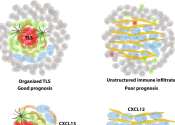Injected bacteria shrink tumors in rats, dogs and humans
A modified version of the Clostridium novyi (C. noyvi-NT) bacterium can produce a strong and precisely targeted anti-tumor response in rats, dogs and now humans, according to a new report from Johns Hopkins Kimmel Cancer ...
Aug 13, 2014
3
0








